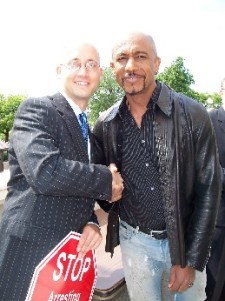May 1, 1972: Nobel Prize laureate for economics Milton Friedman is quoted in Newsweek: "Legalizing drugs would simultaneously reduce the amount of crime and raise the quality of law enforcement. Can you conceive of any other measure that would accomplish so much to promote law and order?"

May 3, 1994: Dear Abby states publicly in her column that "Just as bootleggers were forced out of business in 1933 when Prohibition was repealed, making the sale of liquor legal (thus eliminating racketeering), the legalization of drugs would put drug dealers out of business. It also would guarantee government approved quality, and the tax on drugs would provide an ongoing source of revenue for drug-education programs."
May 2, 2001: The Louisiana Senate, voting 29-5, passes sweeping legislation to bring relief to an overflowing state prison system, including ending mandatory prison time for possession of small quantities of drugs.
May 5, 2001: The United States is voted off the United Nations Narcotics Control Board, the 13-member commission that monitors compliance with UN drug conventions on substance abuse and illegal trafficking.
May 6, 2001: Sydney, Australia, opens its first legal heroin injection room in the Kings Cross Neighborhood, operated by the Uniting Church.
May 1, 2003: The Illicit Drug Anti-Proliferation Act of 2003 (IDAPA) is signed into law, among other things amending a section of the Controlled Substances Act to target rave organizers. It shifts the statute's emphasis from punishing those who establish places where drugs are made and consumed, such as "crack houses," to those who knowingly maintain "drug-involved premises," including outdoor events such as rock concerts. In addition to the criminal penalties in the original statute, the amended statute adds a civil penalty, thereby lowering the standard of proof from beyond a reasonable doubt to a preponderance of evidence.
May 6, 2004: The Houston Chronicle reports that Montel Williams threw his support behind legalizing medical marijuana in New York, saying pot helps him cope with multiple sclerosis. Williams, who was diagnosed with a neurological disease in 1999, says he uses marijuana every night before bed to relieve the pain in his legs and feet. "I'm breaking the law every day, and I will continue to break the law," said Williams, host of the syndicated Montel Williams Show.
Add new comment